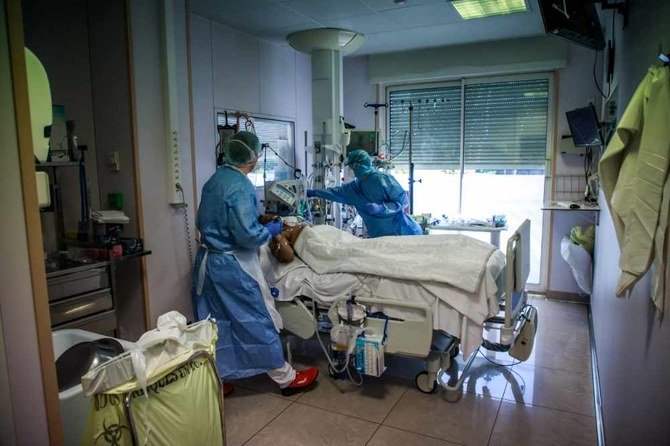
- ARAB NEWS
- 02 Jul 2025

A Saudi nurse returns home from his shift, and breaks down in tears because he cannot give his child the hug that the youngster so clearly needs — another example of the physical and emotional sacrifices health workers worldwide are making in the battle against the coronavirus. In social media posts from Iran to Italy, doctors and other medical staff weep at the deaths they have witnessed, and beg people to stay at home.
https://twitter.com/arabnews/status/1242695457261977600?s=20
Meanwhile, in Dubai, “fitness influencer” Semia Azaiz, known on Instagram as The Trendy Frenchie, mocks official advice on social distancing and self-isolation, and posts videos urging her 41,000 followers to ignore warnings about the health risk to themselves and others, and go out for a run. “Why are you staying at home?” she says. “Do whatever you wanna do.” UAE authorities did just that — they arrested her. Similarly unimpressed, the sportswear giant Reebok dumped her.
In Kuwait, fashion influencer Fouz Al-Fahad has been referred to the public prosecutor after she promoted a home “coronavirus test” kit that she claimed could detect the virus with 95 percent accuracy. The device would have had considerable difficulty in doing this, since it did not in fact exist.
Over the past decade or so we seem to have slipped into the habit of paying attention to social media celebrities based on no more than their possession of a pretty face or an enviable six-pack. But when medical advice is available every day from physicians such as Anthony Fauci, one of the world’s leading immunologists and director since 1984 of the US National Institute of Allergy and Infectious Diseases, do we really need to know what the Trendy Frenchie thinks? Stick to the “killer look,” honey, and leave the killer virus to the experts.
“Corporate social responsibility is needed now more than ever as governments cannot defeat the coronavirus alone”
Faisal J. Abbas
Moreover, companies such as Reebok should perhaps do more than simply turn their backs on influencers who have more lip gloss than sense. They should now move their marketing budgets, if not their whole manufacturing and production lines, to support medical practitioners on the front line who are crying out for the protective equipment they so desperately need. Corporate social responsibility is more than a well-meaning promise on the company prospectus; it is needed in practice, now more than ever as governments cannot defeat the coronavirus alone.
To do our part at Arab News, we have launched a daily feature in which we promote generous acts and cheerful news that spreads hope in these challenging times.
We applaud fashion legend Giorgio Armani, who donated 2 million euros to Italian hospitals and converted his factories to make single-use medical overalls; we applaud Emirati businessman Khalaf Al-Habtoor, who has donated 50 ambulances and a medically equipped building, and is funding a new virology lab to support the health authorities. In Saudi Arabia, we applaud the generosity of Abdul Lateef Jamil, Bupa Arabia, Banque Saudi Fransi and others. In Lebanon, we applaud those who contributed 3 billion lira to a TV fundraiser for local hospitals — from businessmen and stars with big bank accounts to kids with their piggy banks and pocket money. In the UK, we applaud the 500,000 Brits who volunteered to work for the stretched National Health Service.
And speaking of healthcare workers, I want to say two things to you: Thank you, and sorry. Thank you for risking your lives, for isolating yourselves from your loved ones, and for working impossibly long hours to help as many patients as you can. The apology is on behalf of everyone who failed to give you the support you deserved over the years, who failed to see the obvious when Bill Gates warned us back in 2015, who failed to think seriously after watching “Contagion” in 2011 — and who failed to realize that the internet has more to offer than YouTube videos of the keyboard cat playing piano.
• Faisal J. Abbas is the editor in chief of Arab News
Twitter: @FaisalJAbbas